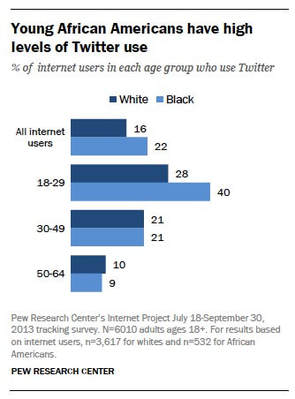 Figure 1: African American Twitter Use. Source: http://www.pewinternet.org/2014/01/06/african-americans-and-technology-use/ Figure 1: African American Twitter Use. Source: http://www.pewinternet.org/2014/01/06/african-americans-and-technology-use/ Written by Serie McDougal and Sureshi Jayawardene In 2014, the Pew Research Center reported that “African Americans have long been less likely than whites to use the internet and to have high speed broadband access at home” which they claimed continues to be the case. This gap between Blacks and Whites is most pronounced among subgroups for both races, such as older African Americans and those who have not attended college. Compared to Whites of the same demographic profile, these subgroups are less likely to go online or have broadband service at home. However, other African Americans who are young, college-educated, and earn a higher income are on equal footing with their White counterparts in terms of internet use and broadband adoption at home. Although African Americans trail Whites in terms of internet use and high-speed broadband access at home, this “digital divide” is less persistent when it comes to types of access. African Americans have exhibited elevated levels of digital literacy and use, especially through mobile platforms. According to the Pew report, 96% of African American internet users between the ages 18-29 use a social networking platform of some kind. Twitter is particularly popular among this demographic. Colloquially known as “Black Twitter,” the social and political currency generated by African American Twitter users underscores the autonomy and credibility afforded to this bloc of social commentators producing results from awareness-raising about issues facing Black communities to influencing important decisions shaping the world (see Figure 1). Examples of such leverage and mobilization include #BlackLivesMatter, #SayHerName, #BankBlack, and #OscarsSoWhite movements that have yielded national dialogue about issues of civic and political importance. The 2016Nielsen report highlights how this demographic—African American millennials—are “driving social change and leading digital advancement.” Specifically, and further supporting Pew’s findings two years prior, Nielsen reports that African American millennials are impacting the tech industry through their increasing use of mobile devices. According to Nielsen, young African Americans’ expanding use of smartphones contributes to increased online activity in the areas of shopping for beauty products, apparel, fresh and healthy foods, primetime television viewership, and other such consumer behaviors. This demographic is not only savvy about the everyday functionality of online consumer behaviors such as these but are just as “adept at using and leveraging digital platforms to communicate with each other and the world around them.” Although African Americans quickly adopt and leverage new digital technologies with great ease and efficacy, they remain underrepresented in the digital workforce. African Americans represent less than five percent of the workforce in most technology companies, according to the National Urban League’s 2018 State of Black America (SOBA) report (NUL, 2018). Making matters worse, the high-tech industry has significantly less workforce diversity than other STEM areas like Telecom (Cravins, 2018). It is important to highlight that the SOBA report does point out that the underrepresentation of Black people in the tech industry is also a consequence of racial bias in hiring practices (Johnson, 2018). Without addressing the underrepresentation of African Americans in the digital economy, the SOBA 2018 report warns that already deep gaps in digital racial equity or tech-equity will only widen. For example, the wave of automation (automatic equipment limiting or eliminating the need for human involvement in processes) threatens to eliminate workers in certain jobs (i.e. bus drivers, cashiers, cooks, and fast-food workers) (Spencer, 2018). Twenty-seven percent of African Americans are concentrated in the jobs most vulnerable to automaton (Spencer, 2018). New technological products are not only changing people’s access to products and services, they are changing ways of living. These changes have not only impacted how people engage one another through technology, but how integrated certain technologies are in their everyday lives. Without a doubt, African Americans have effectively leveraged social media and creatively used it as a tool for social justice movements. And while Nielsen emphasizes the need to better engage the $162 billion buying power of African American millennials in their digital consumption, it is just as important to attend to the inequities and disparities apparent in the digital workforce. The National Urban League’s position is that righting the wrongs of the past and establishing racial equity are dependent upon the efforts of private, government, and corporate sectors. Their hope is to lure the tech industry to invest in racial equity with the fresh voices and talent they could benefit from it. This fatally flawed logic is impaired by a simple failure to account for the fact that the United States of American has always been willing to absorb aggregate losses incurred by inequity for the racialized power and privilege it awards individuals who self-identify as White or at-least non-Black/African. Works Cited Cravins, D. (2018). Smart cities, inclusive growth: Harnessing the enormous economic promise of next generation networks. In the National Urban League (NUL) (2018). State of Black America: Powering the digital revolution. Retrieved from http://soba.iamempowered.com/soba-books Johnson, N.F. (2018). Minding the gap: Connecting diversity with Diverse IT. In the National Urban League (NUL) (2018). State of Black America: Powering the digital revolution. Retrieved from http://soba.iamempowered.com/soba-books National Urban League (NUL) (2018). State of Black America: Powering the digital revoution. Retrieved from http://soba.iamempowered.com/soba-books Neiderdorff, M. (2018). Embracing and engaging the possibilities of the digital revolution. In the National Urban League (NUL) (2018). State of Black America: Powering the digital revolution. Retrieved from http://soba.iamempowered.com/soba-books Overton, S. (2018). Black to the future: Will robots increase racial inequality. In the National Urban League (NUL) (2018). State of Black America: Powering the digital revolution. Retrieved from http://soba.iamempowered.com/soba-books
0 Comments
|
Archives
January 2019
Categories
All
|
 RSS Feed
RSS Feed